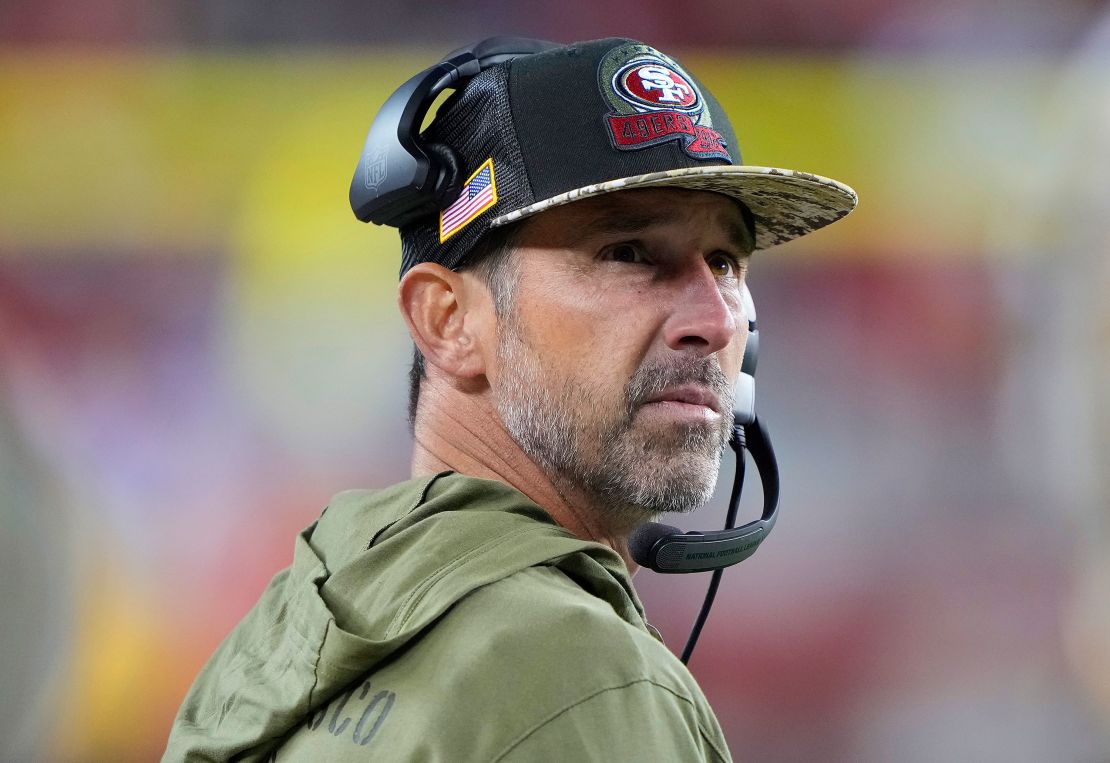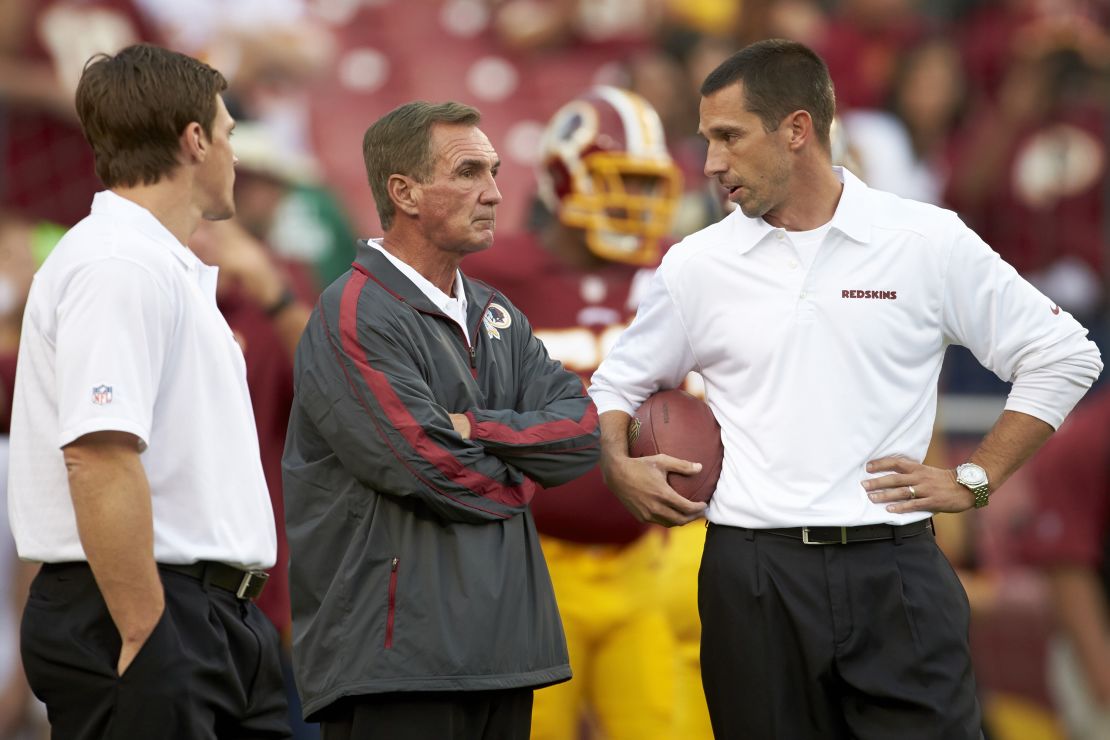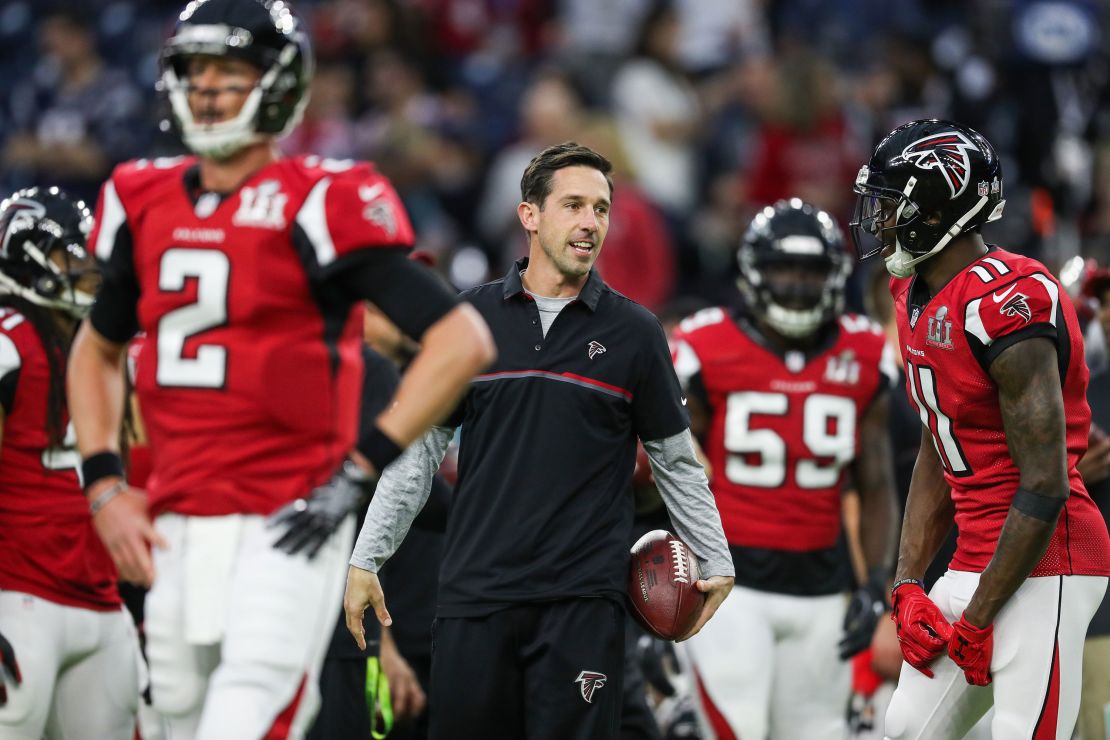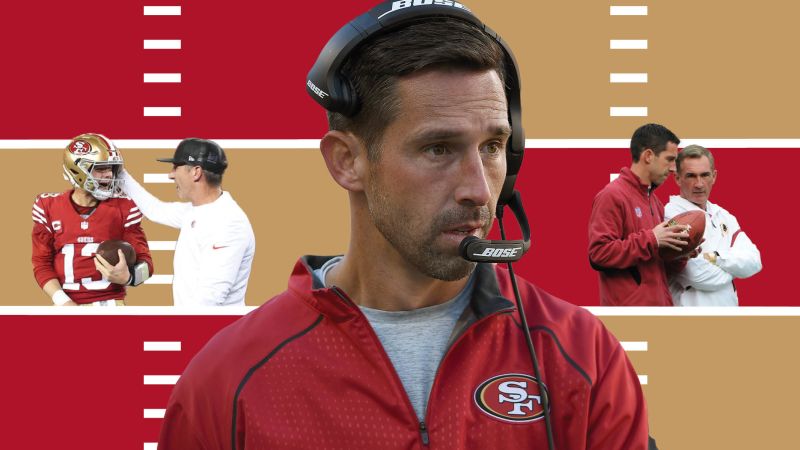CNN
—
Some say that football runs in their family. For San Francisco 49ers head coach Kyle Shanahan, it quite emphatically does.
Serving in his seventh year in the top job in San Francisco, Shanahan is now widely regarded as one of the finest offensive minds in the National Football League (NFL), but how he did he get here?
From a young prodigy, to facing disappointment and then shaking off any possible ‘nepo baby’ tag, Shanahan’s journey to his second Super Bowl has been one to watch.
Shanahan in San Fran
Mike Silver, a columnist for the San Francisco Chronicle and longtime NFL writer and analyst, has known the San Francisco coach for over two decades and remembers the first time he spoke with a 15-year-old Shanahan.
Silver was following Mike Shanahan, Kyle’s father, when he served as head coach of the Denver Broncos and, after practice one day, he got some one-on-one time with the younger Shanahan.
“I remember it vividly,” Silver explains, adding they never once spoke about football. “I was like: ‘Dude, what’s it like to be in high school?’ We were talking about movies and comedies and all sorts of stuff.”
While Silver could not have predicted Shanahan’s success during that conversation, ever since that moment, he has followed his career closely. With the pair now both in San Francisco, he has a first row seat for the 44-year-old’s debut head coaching job.
After making waves in various offensive roles throughout the league, Shanahan quickly rose to prominence and, in 2017, was named to his first ever head coaching job with the 49ers.
So far, Shanahan has enjoyed an incredibly successful time in the Bay Area: a Super Bowl appearance in the 2019 season was followed by back-to-back NFC Championship Games in 2022 and 2023.
However, Shanahan and San Francisco have always fallen slightly short of the ultimate goal – winning a Super Bowl title – something Silver says needs to be changed to cement the head coach’s legacy with the franchise.
“He has to win a ring,” Silver explains. “Nobody’s going to say he hasn’t done an incredible job. They’ve been to four conference title games in five years, they have an incredible collection of talent and they’ve done a lot of cool things … but he’s going to have to get this one or another one later.
“It’s a cruel, cruel world,” Silver says of the NFL’s harsh expectations of greatness. “But, you know, it’s even crueler with Patrick Mahomes standing between you and the awards podium, that’s no fun.”
Despite the losses, the ability to produce multiple deep playoff runs has stood out during Shanahan’s time in charge.
This consistency has been built on the offensive play calling and innovativeness of the head coach.
“I think if you gave truth serum to the other really, really smart coaches who are great at calling plays and creating plays and scheming it up, probably he’d win the vote as to who’s the most advanced,” Silver outlines.
Not only does Shanahan impress with his play calls, but he is blessed with one of the finest offenses in the NFL, including star skill position players in Christian McCaffrey, Deebo Samuel, Brandon Aiyuk, George Kittle and quarterback Brock Purdy.

Silver describes keeping all these explosive players happy as a “champagne problem” and says that, if the offense runs the way Shanahan envisions it, then everyone would get their fair share of action.
A key cog of this masterplan is Shanahan’s relationship with Purdy, who he drafted with the final pick of the 2022 Draft.
“As someone who’s watched [Purdy] closely now for 14 months, he’s got an incredible temperament. He’s a stone-cold killer,” outlines Silver.
Paired with his gutsy performances, Silver adds that these are crucial ingredients in the pair’s success. Purdy seems to never be afraid to attempt the big play when Shanahan dares him to make it.
Shanahan’s playcalling will prove vital during Super Bowl LVIII, but how did the young head coach make it to the precipice of the NFL?
Wunderkind
He might be a coach who utilizes so many of them in his offense, but there was only ever one route when it came to Shanahan’s career, and that was to make it in the NFL – in some way, shape or form.
“I studied every potential X’s and O’s play and issue possible,” Shanahan told the Denver Post in 2006. “I spent my whole life working on that. My goal was that any question a player could have about anything on the field, I’d be able to answer it.”
Shanahan grew up immersed in football. His father coached college ball before heading to the NFL where he embarked on an almost 30-year coaching stint in a variety of positions with different franchises, winning two Super Bowls (XXXII and XXXIII) as head coach in the process with the Broncos.
While Shanahan has admitted his father’s connections opened doors in the league, his success since stepping into the NFL has been of his own making. Silver says that to those in NFL circles, Shanahan put to bed his dependence on his father a long time ago.
First up, though, was a college job for a green Shanahan.
“When he decided that he wanted to be a coach, he went with Karl Dorrell over at UCLA,” dad Mike told NBC Sports in 2020. “He was there for a year but then he found out that when you’re a graduate assistant, you actually have to go to school. It’s not football all the time.”
Just a year later, Shanahan was in the NFL. It then wouldn’t be long before he became the youngest position coach in the league with the Houston Texans and then, at just 28 years old, the youngest offensive coordinator in the league.
Shanahan was out not just to prove that his age wasn’t a problem, but it was instead a positive.
“As long as you can help (players), they will listen and respect you,” Shanahan said to the Texans in 2007. “The fact that I’m young only helps me to relate with them better. It makes my job easier. I understand them better.
“I understand this moment that they are at in their life because I’m going through the same things.”
But throughout his career, critics of Kyle have always maintained that his family connections were the reason he’s where he is today. This sentiment only intensified when, following Kyle’s spell in Houston, the Shanahans teamed up.
Mike was head coach of the then-Washington Redskins and hired his son to be the team’s new offensive coordinator.

Washington struggled offensively during Kyle’s time as coordinator with some questioning the validity of how he got the job – and then stayed in the position.
“If Kyle had any other last name, his job might be up for discussion this offseason,” the Washington Post said in 2011 in a piece titled “Kyle Shanahan, hired by Mike Shanahan, must share the blame for Redskins’ woes.”
“I think (a Super Bowl) ring makes that all go away,” Silver says of Shanahan’s nepotism critics.
Super Bowl anguish
Following his time in Washington, Shanahan went to the Cleveland Browns and then excelled with the Atlanta Falcons as the team’s offensive coordinator.
While Shanahan’s time in Atlanta was a success, it will perhaps be most remembered for his disappointment in the Super Bowl.
Tom Brady and the New England Patriots took down the Falcons after making the largest comeback in Super Bowl history, coming back from a 28-3 deficit in the third quarter of Super Bowl LI to win 34-28.
“He’s had the stigma of 28-3 which isn’t necessarily fair to me,” explains Silver. “Kyle, as the offensive coordinator, kind of bore the brunt of that … [and] he carries this tag still to a degree”

Then, after reaching his first Super Bowl as a head coach in 2020 – leading the 49ers to his old stomping ground in Houston for Super Bowl LIV – it was another loss on football’s biggest stage for Shanahan.
San Francisco was defeated 31-20 by the Kansas City Chiefs, with his team once again surrendering a second-half lead.
It’ll be Mahomes and the Chiefs again for Shananan on February 11 in Las Vegas at Super Bowl LVIII, but will he have learned from previous failings?
Silver says the Niners head coach is all about winning and won’t feel complete until he gets his hands on the Vince Lombardi Trophy.
Full circle
When the San Francisco 49ers last won the Super Bowl in 1994, Kyle happened to be on the sideline as a 15-year-old ballboy with his dad Mike working as the team’s offensive coordinator.
“It was great. Just being down there, being a part of that stuff, being on the field after. Just being able to wander around the locker room and trying to collect anybody’s gloves who left them around,” Kyle told reporters before Super Bowl LIV.
It won’t be long before Shanahan is back on the sidelines at another Super Bowl – not as a ballboy, but in a slightly more senior role, looking to banish the demons of Super Bowls past and the pesky label critics have perhaps unjustly given him.






